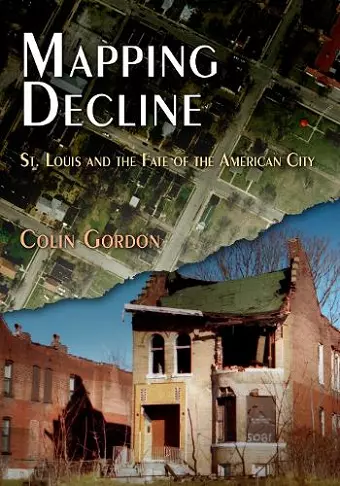Mapping Decline
St. Louis and the Fate of the American City
Format:Paperback
Publisher:University of Pennsylvania Press
Published:9th Oct '09
Currently unavailable, and unfortunately no date known when it will be back

Once a thriving metropolis on the banks of the Mississippi, St. Louis, Missouri, is now a ghostly landscape of vacant houses, boarded-up storefronts, and abandoned factories. The Gateway City is, by any measure, one of the most depopulated, deindustrialized, and deeply segregated examples of American urban decay. "Not a typical city," as one observer noted in the late 1970s, "but, like a Eugene O'Neill play, it shows a general condition in a stark and dramatic form."
Mapping Decline examines the causes and consequences of St. Louis's urban crisis. It traces the complicity of private real estate restrictions, local planning and zoning, and federal housing policies in the "white flight" of people and wealth from the central city. And it traces the inadequacy—and often sheer folly—of a generation of urban renewal, in which even programs and resources aimed at eradicating blight in the city ended up encouraging flight to the suburbs. The urban crisis, as this study of St. Louis makes clear, is not just a consequence of economic and demographic change; it is also the most profound political failure of our recent history.
Mapping Decline is the first history of a modern American city to combine extensive local archival research with the latest geographic information system (GIS) digital mapping techniques. More than 75 full-color maps—rendered from census data, archival sources, case law, and local planning and property records—illustrate, in often stark and dramatic ways, the still-unfolding political history of our neglected cities.
"Colin Gordon combines intellectual rigor, a compelling argument, and extensive archival research with the latest geographic information system digital mapping techniques. Dozens of color maps, together with numerous figures and tables, allow the reader to examine the data with fresh eyes. Gordon's focus on a single city, a single neighborhood (Greater Ville), and even a single house (4635 North Market Street) gives his comprehensive analysis an immediacy and power that it might otherwise lack. And the prose is so thoughtful, so well written, and so engaged with recent scholarship that scholars on the topic will be fascinated."—Kenneth Jackson, Political Science Quarterly
"Knowledgeably argued, exhaustively researched, and accessibly written, Gordon's book also employs the latest in digital mapping technology. . . . For brick-and-mortar urban specialists . . . Mapping Decline is nothing short of monumental."—Urban History
"A searing indictment of policymakers, realtors, and mortgage lenders for deliberate decisions that sacrificed their own city of St. Louis on the altar of race. Colin Gordon's use of cartography to visualize this painful pattern of injustice and bad sense is a forceful exemplar for a new kind of history: one told visually as well as textually; analyzed spatially as well as chronologically. Written with empathy, Mapping Decline is a new milestone on the road toward a necessary reckoning of the precise responsibility for the extended urban crises of the twentieth and twenty-first centuries."—Philip J. Ethington, University of Southern California
"Colin Gordon has infused the 'old' story of urban decline with new energy and urgency. His mapping of St. Louis's evolution is a powerful indictment of the distorting, segregating, and wasteful effects of public policy over several generations. Yet the book is not just about history. Incredibly, as Gordon shows, current national and state policies and governmental fragmentation continue to undermine the recovery of American cities at the precise moment when they matter again—economically, environmentally, and socially."—Bruce Katz, Brookings Institution
ISBN: 9780812220940
Dimensions: unknown
Weight: unknown
304 pages